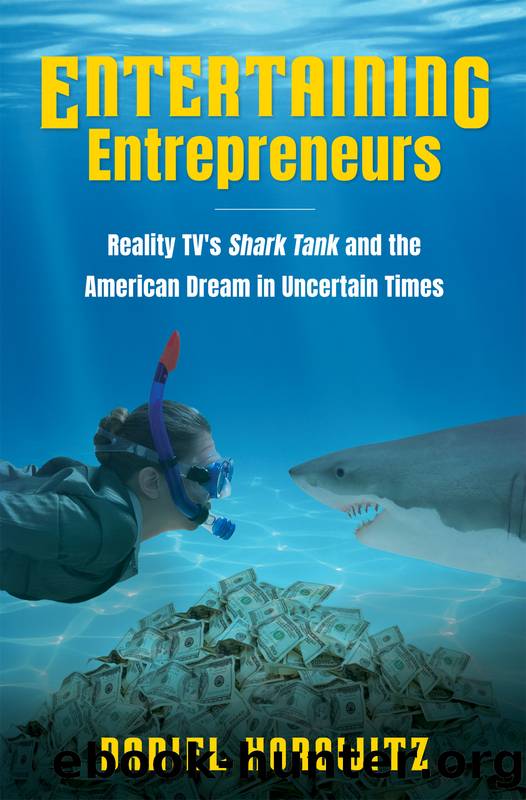Entertaining Entrepreneurs by Daniel Horowitz

Author:Daniel Horowitz [Horowitz, Daniel]
Language: eng
Format: epub
Publisher: The University of North Carolina Press
Published: 2020-10-15T00:00:00+00:00
On November 1, 2014, Saturday Night Live presented a send-up of Shark Tank in which four actors portrayed aspiring entrepreneurs from the terrorist organization ISIS. In its skillful mimicry, the skit attested to the cultural resonance of Shark Tank. Here, in the skitâs dramatic ending, law enforcement officers arrest the ISIS members so that the faux Daymond John can collect the bounty offered for their capture.
Among the indications of the power of Shark Tank specifically and of entrepreneurship generally is the proliferation of Shark Tankâstyle competitions, including in elementary schools. Here, a fifth grader in Corpus Christi, Texas, pitches his product at his schoolâs Entrepreneur Quest competition. Apple White / Alamy Stock Photo.
A prime example of nonprofits and corporations joining with schools to promote entrepreneurship was the Social Innovation Series launched by the software company SAP and GENYOUth, a nonprofit organization that promotes physical health for students and sponsors a student social entrepreneurship program called AdVenture Capital. The Social Innovation Series was a six-city series of one-day workshops in which teenagers with an idea for solving a problem in their school met with SAP employees who helped them prepare a presentation; at the end of the day, the students pitched their idea to a panel of judges, also from SAP, and asked for funding to implement it. âIt really brings out that entrepreneurial spirit kids naturally haveâthe want and need to think big we kind of lost as adults,â remarked a spokeswoman for SAP.31
Another example of a Shark Tank imitator that revealed the intertwined connections between schools, business corporations, and foundations was a conference in Boise, Idaho, in September 2016. The conference was held by America Succeeds, a nonprofit organization that aims to increase schoolsâ focus on business practices, and was sponsored by the J. A. and Kathryn Albertson Family Foundation, a charitable organization built by the family behind the nationâs second-largest grocery chain. âOur nation is at a crossroads in the history of public education,â representatives of the program announced. âPresidential politics notwithstanding, preparing our students to succeed in the global economy remains our nationâs highest calling and most vexing challenge.â At the invitation-only meeting, the main event was a competition modeled on Shark Tank in which philanthropic Sharks, such as representatives from the Gates Foundation, heard from organizations offering breakthrough innovations designed to overcome âthe obstacles that lie between the unacceptable status quo and educational excellence for all kids.â32
The ideology of entrepreneurship underlying such endeavors is only partially hidden in the language of partnerships, pedagogy, and global competition the nonprofits and corporations use. Yet at key moments, the larger implication of these programs becomes clear. In May 2015, Money magazine reported on a class modeled on the Shark Tank that James Kindle taught to middle school students at Sullivan Community School in Minneapolis. âI want to give my students a tasteâ of the American dream, Kindle remarked, âwhile teaching persuasive language, entrepreneurship, and financial literacy skills.â33
Even more pervasive and ideologically inflected than what I witnessed in San Ramon at DECA meetings are Shark Tankâlike competitions at colleges and universities.
Download
This site does not store any files on its server. We only index and link to content provided by other sites. Please contact the content providers to delete copyright contents if any and email us, we'll remove relevant links or contents immediately.
Pioneering Portfolio Management by David F. Swensen(6278)
Man-made Catastrophes and Risk Information Concealment by Dmitry Chernov & Didier Sornette(5995)
Zero to One by Peter Thiel(5778)
The Motivation Myth by Jeff Haden(5199)
The Miracle Morning by Hal Elrod(4698)
Elon Musk by Ashlee Vance(4117)
The Art of Persistence: Stop Quitting, Ignore Shiny Objects and Climb Your Way to Success by Michal Stawicki(3642)
Unlabel: Selling You Without Selling Out by Marc Ecko(3642)
Delivering Happiness by Tony Hsieh(3410)
Urban Outlaw by Magnus Walker(3386)
Purple Cow by Seth Godin(3188)
The Marketing Plan Handbook: Develop Big-Picture Marketing Plans for Pennies on the Dollar by Robert W. Bly(3036)
Mastering Bitcoin: Programming the Open Blockchain by Andreas M. Antonopoulos(3033)
The Power of Broke by Daymond John(2958)
The Content Trap by Bharat Anand(2912)
Applied Empathy by Michael Ventura(2884)
The Airbnb Story by Leigh Gallagher(2835)
Keep Going by Austin Kleon(2751)
Radical Candor by Kim Scott(2709)
